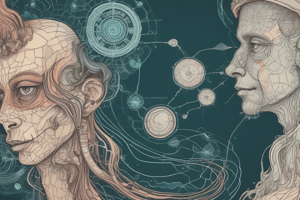Podcast
Questions and Answers
What is the main purpose of a science experiment?
What is the main purpose of a science experiment?
- To figure out the structure and behavior of the world using a systematic method (correct)
- To test only one variable
- To collect as much data as possible
- To prove a hypothesis
What is the independent variable in an experiment?
What is the independent variable in an experiment?
- The variable being kept constant
- The variable being measured
- The variable with the most data
- The variable being changed (correct)
Why is it essential to keep everything else the same in an experiment?
Why is it essential to keep everything else the same in an experiment?
- To make the experiment more efficient
- To collect more data
- To make the experiment more exciting
- To ensure a fair test (correct)
What does the accuracy of data measure?
What does the accuracy of data measure?
What would happen if you measured the grass length from the edge of the ruler instead of the zero line?
What would happen if you measured the grass length from the edge of the ruler instead of the zero line?
What does the reproducibility of data measure?
What does the reproducibility of data measure?
What is the difference between accuracy and reproducibility?
What is the difference between accuracy and reproducibility?
What is the main difference between the two sets of measurements of grass length?
What is the main difference between the two sets of measurements of grass length?
What would increase the precision of measuring water falling on the grass?
What would increase the precision of measuring water falling on the grass?
What does accuracy refer to in data measurement?
What does accuracy refer to in data measurement?
What would happen if you didn't include the rain that first morning while measuring water?
What would happen if you didn't include the rain that first morning while measuring water?
What does the graph of precise data look like?
What does the graph of precise data look like?
Why is the first set of grass length measurements more precise than the second?
Why is the first set of grass length measurements more precise than the second?
What is the difference between the two graphs shown?
What is the difference between the two graphs shown?
What is reproducibility in data measurement?
What is reproducibility in data measurement?
Flashcards are hidden until you start studying
Study Notes
What is a Science Experiment?
- A science experiment is a systematic method to understand the world's structure and behavior.
- In an experiment, one variable (independent variable) is changed to observe its effect on another variable (dependent variable).
- All other factors must be kept constant to ensure a fair test.
Example of a Science Experiment
- Investigating how the amount of watering affects the height of grass growth.
- The independent variable is the amount of water used, and the dependent variable is the height of the grass.
- Keeping other factors constant, such as sunlight, soil, and location.
Accuracy and Reproducibility of Data
- Accuracy of data refers to how close it is to being correct.
- Examples of inaccurate data include measuring from the edge of a ruler instead of the zero line, or not accounting for extraneous factors like rainfall.
Reproducibility or Precision of Data
- Reproducibility, or precision, of data refers to how close together measurements are.
- Examples of precise data include taking multiple measurements and getting similar results, or using high-tech equipment to measure data accurately.
- Graphs can be used to visualize precise and less precise data, with precise data points clustering close to the best-fit line.
Studying That Suits You
Use AI to generate personalized quizzes and flashcards to suit your learning preferences.




